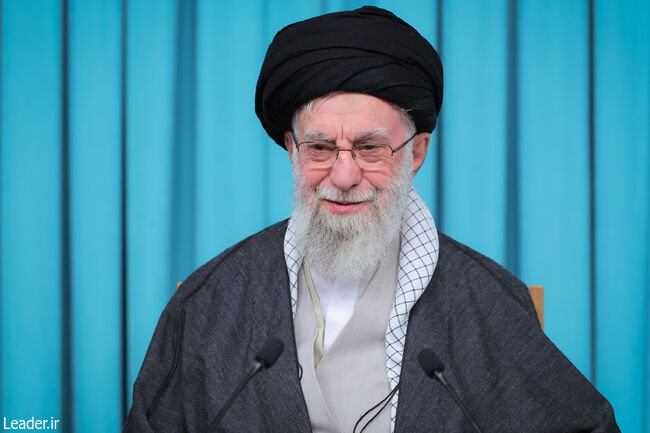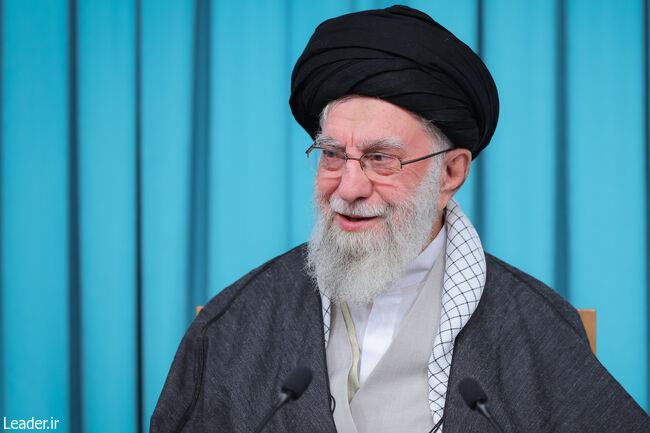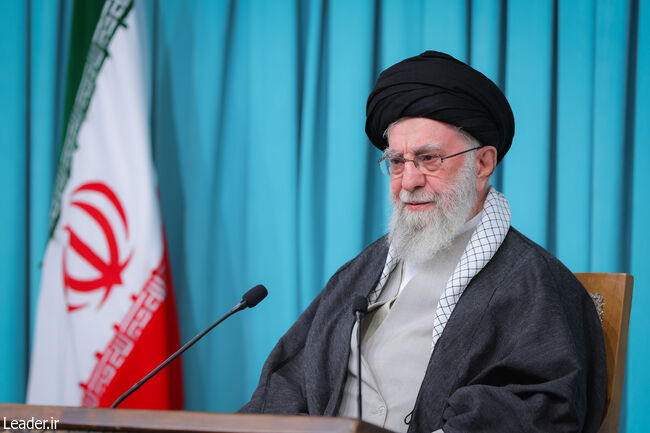Tonight, in a televised address to the nation, Ayatollah Khamenei, the Leader of the Islamic Revolution, described the Iranian people’s steadfast unity and solidarity as a steel fist on the enemy's head. He explained the reason why the proud Iranian nation has not yielded to the enemy’s pressure and threats to make it abandon the highly beneficial technology of uranium enrichment. He said that negotiations whose outcome America specifies and dictates from the outset are useless and harmful, because they encourage the bullying enemy to impose further demands while warding off no harm from the country. No honourable nation or any wise statesman would accept such negotiations.
At the beginning of his remarks, the Leader of the Revolution congratulated the people on the arrival of the month of Mehr, the month of learning and knowledge. He noted that this month marks the movement of millions of youths, teenagers, and children toward knowledge and competence. He strongly urged the country’s officials, especially in the Ministries of Education, Science, and Health, to recognise the great value of Iranian youth, emphasising that their extraordinary talent is a divine blessing that must be cultivated and utilised.
Referring to the forty colourful medals, including 11 gold medals, won by Iranian students in international competitions over the past two months, he said, “Despite the twelve-day war and the challenges arising from it, our students won first place in the world in astronomy, and also earned high rankings in other fields. It is this very talent that has enabled our youth in recent days to shine in wrestling, and earlier to bring honour in volleyball and other disciplines as well.”
The Leader of the Revolution also made reference to the anniversary of the martyrdom of Martyr Sayyid Ḥasan Naṣrallāh. He mentioned that this great mujahid was an immense treasure for the world of Islam, for Shīʿism, and for Lebanon. He said, “The treasure that Sayyid Ḥasan Naṣrallāh created, including Ḥizbullāh, endures and continues, and this great treasure must not be neglected, whether in Lebanon and beyond.”
Ayatollah Khamenei gave honour to the memory of the commanders, scientists, and other martyrs of the twelve-day war, and offered his profound and heartfelt condolences to their families. He then focused on the main points of his televised address to the nation centred around three themes: the importance of the Iranian people’s unity and solidarity in the twelve-day war and for the present and future of the country; explaining the significance of highly beneficial uranium enrichment; and clarifying the steadfast and wise position of the nation and the system in the face of American threats.
Elaborating on the first theme, he identified the unity of the people as the primary factor in frustrating the enemy's plans during the 12-day war. He said, “The assassination of commanders and certain influential figures was a means by which the enemy, with the help of its agents, attempted to foment unrest and turmoil in the country, particularly in Tehran. The goal was, if possible, to incite people against the Islamic Republic and bring them into the streets, disrupt the country's affairs, target the very foundation of the system, and ultimately, through subsequent schemes, eradicate Islam from this land."
Ayatollah Khamenei said that the swift appointment of replacements for the martyred commanders, the strengthened resolve and heightened morale of the armed forces, and the orderly, rule-based administration of the country were all factors that contributed to the enemy's defeat. However, he pointed out that the people were the most crucial element in thwarting the enemy's plans. Through their unity and solidarity, they absolutely refused to comply with the enemy's demands and instead filled the streets in protest against the aggressors and in defence of the Islamic Republic.
He spoke about the enemy’s reproach of its own agents in Iran for their incompetence and inability, adding, “The lackeys of Zionism and America had replied that they had tried, but the people turned their backs on them, and the country’s officials effectively managed affairs.”
The Leader of the Revolution mentioned that the unity and solidarity of the people were the factors that rendered the aggressors' plans futile. He said, “The important point is that this decisive unity still endures and remains highly effective.”
He criticised those who take their cues from abroad, trying to suggest that the nation's unity only belonged to the time of war. He said, "Some claim that differences of opinion will eventually emerge, and that through the exploitation of ethnic fault lines and political disagreements, the people can be incited into unrest and turmoil, but this is utterly wrong."
Pointing to the pride that all of the country’s ethnic groups take in being Iranian, Ayatollah Khamenei said, “We naturally have political differences as well, but in the face of bullies, the entire nation, both today and tomorrow, will come down on the enemy's head like a fist of steel.”
He described today's Iran as the same Iran of the 23rd and 24th of Khordad in the past, adding, "In those days, the streets filled with crowds of people and their resounding chants against the accursed Zionists and criminal America were a clear sign of the nation’s unity and cohesion. This unity still exists and will continue to exist, and certainly, everyone is responsible for preserving and strengthening it."
In the second part of his speech to the nation, the Leader of the Revolution referred to the frequent mention of the word "enrichment" in political and foreign discourse. He stated, "It must be understood why this issue is so important to the enemy."
Inviting experts to expound on the dimensions and benefits of enrichment, he said, “In enrichment, our scientists and specialists take the uranium extracted from the country’s mines and, through complex and advanced technical processes, convert it into the highly valuable material of enriched uranium that has numerous applications in various fields and in people’s lives.”
Ayatollah Khamenei enumerated the diverse applications of enriched uranium in agriculture, industry and materials, the environment, natural resources, health and medicine, nutrition, and research and education. He added, “In the production of electricity, the use of enriched uranium is also far cheaper and free of environmental pollution. Nuclear power plants have a very long lifespan and multiple advantages. For this reason, many developed countries utilise them. However, the fuel of our power plants is predominantly gasoline and gas, which are very costly.”
Explaining the formation of the enrichment industry in the country, the Leader of the Revolution said, "We did not possess this technology, nor did others meet our needs, but through the efforts of a few determined managers and senior officials, we began this endeavour over thirty years ago, and now we have attained a high level in enrichment."
He said the aim of some countries in enriching uranium to 90% is to produce nuclear weapons, and added, “Because we do not possess nuclear weapons and our decision is not to build or use such weapons, we have increased our enrichment to 60%, which is excellent.”
Ayatollah Khamenei described Iran as one of the ten countries in the world with an enrichment industry among more than 200 countries in the world. He said, " Beyond advancing this sophisticated technology, the important work of our scientists has been training personnel. Today, tens of prominent scientists and professors, hundreds of researchers, and thousands of trained personnel in fields related to nuclear technology are working and striving. Yet the enemy imagines that by bombing some facilities or threatening to bomb them, this technology in Iran will be eradicated."
He pointed to decades of fruitless pressure by bullying powers to force the Iranian nation to surrender and to make the country abandon enrichment, and stressed, "We have not surrendered and will not surrender, and we will not yield to pressure in any other matter either."
The Leader of the Revolution said, “The Americans used to say, ‘Do not pursue high-level enrichment and transfer enriched products outside Iran,’ but now the American side has become adamant, insisting that we must have no enrichment at all.”
He said, "What this bullying means is that you should let this major achievement, obtained through investment and relentless effort, go up in smoke. However, the valiant Iranian nation will not accept such words and will forcefully reject them."
In presenting the third key point of his remarks, the Leader of the Revolution referred to the differing views expressed by political circles regarding the issue of negotiations with America. He said, “Some people believe that negotiations with America are beneficial, while others see it as harmful. But I will share with our dear nation what we have understood and witnessed over many years, and I ask officials and political actors to reflect upon these matters and make judgments based upon awareness.”
Ayatollah Khamenei said, "It may be that in the future, for instance, 20 or 30 years from now, the situation may be different. However, under the current circumstances, negotiating with America is a futile endeavour that absolutely does not serve the national interest and does not avert any harm to the country. On the contrary, it brings about significant and sometimes irreparable damage."
Explaining the futility of negotiating with America, he said, “The American side has already predetermined and announced the outcome of negotiations from their own perspective. They want negotiations whose outcome would be the cessation of nuclear activities and enrichment inside Iran.”
The Leader of the Revolution called sitting at the table for such negotiations as tantamount to accepting the dictation, imposition, and bullying of the opposite side, adding, "Now, they have demanded that enrichment be stopped, and a few days ago, their deputy said that Iran should not even possess medium and short-range missiles. This means they want Iran's hands to be so tied and empty that if it faces aggression, it wouldn't even be able to respond to American bases in Iraq or elsewhere."
He regarded such expectations and statements by American officials as stemming from a failure to understand the Iranian nation and the Islamic Republic, and ignorance of the philosophy, foundation, and path of Islamic Iran. He said, "As we say in Mashhad, these words are bigger than the mouth of the one who utters them and are not worthy of attention."
After explaining the futility of negotiating with America, Ayatollah Khamenei turned to outlining its major harms. He said, “The other side has threatened that if you do not negotiate, such and such will happen. Therefore, agreeing to such negotiations signals that the nation and the country are susceptible to threats, that they are fearful, and of the country’s surrender in the face of intimidation.”
He said that yielding to America's threats would only lead to endless and excessive demands from the bully, adding, "Today, they say if you engage in enrichment, we will take such and such actions, and tomorrow, they will use possessing missiles or having relations with a certain country as grounds for threats and coercion to force a retreat."
Ayatollah Khamenei stressed, “No honourable nation accepts negotiations accompanied by threats, and no wise statesman would endorse them.”
The Leader of the Revolution called the promise of concessions by the other side in exchange for accepting its demands a lie. Referring to the experience of the JCPOA, he noted, “Ten years ago, we entered into an agreement with the Americans. Based on it, a nuclear production facility was to be shut down, and enriched materials were either to be removed from the country or diluted. In exchange, sanctions were to be lifted and Iran’s case at the International Atomic Energy Agency was to return to normal.”
Ayatollah Khamenei added, "At that time I told the officials that ten years is a long time, almost a lifetime; so why are you accepting it? It was decided not to agree, but in the end they did. In any case, now that those ten years have passed, not only has our nuclear file not been normalised, but its problems in the Security Council and the IAEA have even increased."
He said that America reneged on its promises to lift sanctions, it withdrew from the JCPOA, and, as the common phrase goes, tore up the agreement despite Iran’s fulfilment of its commitments. He said, “The other side is like this; if you negotiate with them and accept their demands, it leads to the country’s surrender and weakness and the destruction of the nation’s honour; and if you refuse, the same disputes and current threats will continue.”
The Leader of the Revolution said it was essential not to forget the country's experiences, including the lessons of the past ten years. He added, "For now, I do not intend to address any issue with Europe. However, the other side, meaning America, has broken its promises in everything and has lied in every matter. It periodically issues military threats, and if it gets the chance, it assassinates our prominent figures, like our beloved Commander Soleimani, or bombs our facilities. How could one negotiate and make arrangements with such a party in trust and confidence?"



